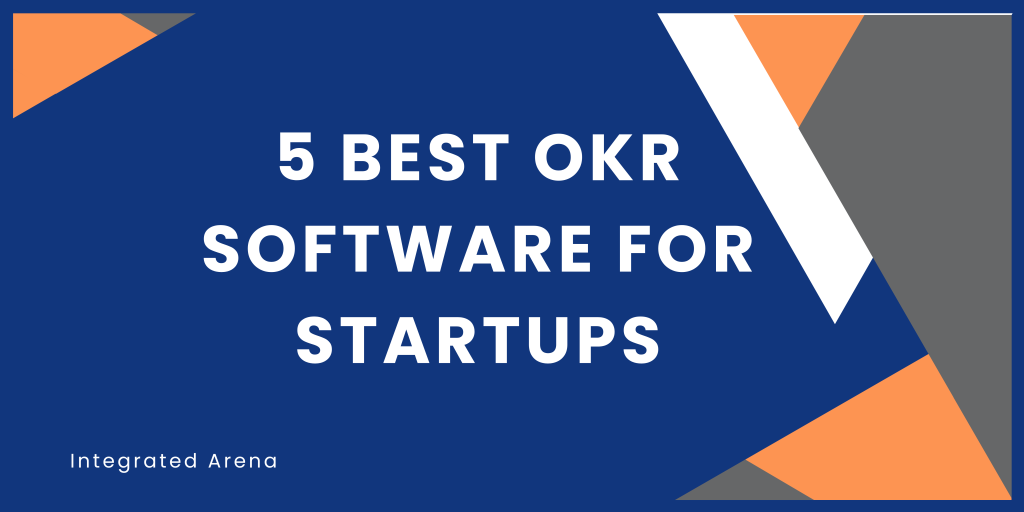OKR (Objectives and Key Results) is designed to help startups to set & manage the goals which is particularly useful for startups to provide a structured plan. It is a tool designed to help startups set, track, and manage their goals and outcomes. This type of software is particularly useful for startups because it provides a structured framework to ensure that all team members are aligned with the company’s strategic objectives and can measure their progress effectively.
OKR Software for Startups:
- ‘O’ stands for Objectives: What you want to achieve.
- ‘KR’ stands for Key Results: How you know you are achieving it.
- ‘OKR’ Software: A tool that helps you set, track, and reach your goals.
Key Objectives to Use OKR Software Effectively:
- Set Clear Objectives:
Define what you want to achieve. Make sure the objectives are specific and easy to understand.
- Define Key Results:
Identify measurable outcomes that show progress. Make sure they are specific and quantifiable.
- Track Progress Regularly:
Check-in on progress frequently. Use the software to update and review key results.
- Encourage Team Collaboration:
Use the software to communicate and collaborate. Share feedback and updates to keep everyone aligned.
- Analyze and Adjust:
Use reports and data to see what’s working. Be ready to change plans if needed.
Key Features of OKR Software for Startups:
Goal Setting:
- Facilitates the creation of clear and measurable objectives.
- Allows for the definition of key results that indicate progress toward objectives.
Alignment:
- Ensures that individual, team, and company-wide goals are aligned.
- Helps visualize how each person’s work contributes to the broader company goals.
Progress Tracking:
- Provides real-time tracking of objectives and key results.
- Uses dashboards and progress bars to visually represent achievement levels.
Collaboration and Feedback:
- Includes tools for team collaboration, such as check-ins, comments, and feedback.
- Encourages regular communication and updates on goal progress.
Reporting and Analytics:
- Generates reports to analyze performance and identify trends.
- Offers insights and analytics to understand which goals are on track and which need attention.
Integration:
- Integrates with other productivity tools like Slack, Jira, and project management software.
- Streamlines workflow by syncing with existing business systems.
Customization:
- Allows customization to fit the specific needs of the startup.
- Offers templates and flexible configurations to cater to different industries and business models.
Here are five top OKR (Objectives and Key Results) software tools that are particularly well-suited for startups:
1. Gtmhub
Website: Gtmhub
Key Features:
- Automated OKR Tracking: Integrates with over 150 business systems to automatically update OKRs.
- Customizable Dashboards: Offers real-time, customizable dashboards for tracking progress.
- Advanced Analytics: Provides insights and analytics to measure OKR performance and identify trends.
- Collaboration Tools: Facilitates collaboration with features like check-ins, comments, and notifications.
Why It’s Good for Startups:
- Scalability: Can grow with the startup, from small teams to larger organizations.
- Ease of Use: Intuitive interface that’s easy to set up and use, reducing the learning curve for new users.
Pros:
- Automated Tracking: Integrates with over 150 business systems for automatic OKR updates.
- Customizable Dashboards: Real-time, customizable dashboards provide immediate insights.
- Advanced Analytics: In-depth analytics to measure OKR performance.
- Collaboration Tools: Facilitates team collaboration with check-ins, comments, and notifications.
- Scalability: Suitable for both small teams and larger organizations.
Cons:
- Complexity: Might be overwhelming for very small teams or those new to OKRs.
- Cost: Can be pricey for startups on a tight budget.
- Integration Setup: Setting up integrations can be complex.
- Learning Curve: Requires time to fully leverage all features.
- Customization Needs: High customization might require more setup time initially.
2. Weekdone
Website: Weekdone
Key Features:
- Simple OKR Setup: Streamlined process for setting and tracking OKRs.
- Weekly Check-Ins: Encourages regular progress updates and reflections.
- Team Feedback: Provides tools for giving and receiving feedback within teams.
- Integrations: Connects with other tools like Slack and Jira for seamless workflow integration.
Why It’s Good for Startups:
- Affordability: Cost-effective pricing plans suitable for startups.
- Focus on Team Engagement: Helps foster a culture of transparency and continuous improvement.
Pros:
- Ease of Use: Simple setup and user-friendly interface.
- Affordable: Cost-effective pricing plans for startups.
- Weekly Check-Ins: Encourages regular updates and progress reflections.
- Team Feedback: Tools for giving and receiving team feedback.
- Integrations: Connects with Slack and Jira for seamless workflows.
Cons:
- Limited Advanced Features: May lack advanced analytics and reporting tools.
- Basic Interface: The simplicity might not cater to more complex needs.
- Scalability Issues: May not scale well for larger organizations.
- Customization Limits: Limited customization options compared to other tools.
- Support: Customer support response times can vary.
3. Ally.io
Website: Ally.io
Key Features:
- Alignment Tools: Ensures OKRs are aligned across the organization, from top-level goals to individual tasks.
- Performance Metrics: Detailed metrics and KPIs to track the performance of OKRs.
- OKR Templates: Predefined templates to help get started quickly.
- Cross-Functional Collaboration: Facilitates collaboration across different departments and teams.
Why It’s Good for Startups:
- Alignment and Focus: Helps ensure everyone is working towards the same strategic objectives.
- User-Friendly: Simple and intuitive interface that doesn’t require extensive training.
Pros:
- Alignment Tools: Ensures OKRs are aligned across the organization.
- Performance Metrics: Detailed metrics and KPIs for tracking OKRs.
- Templates: Predefined templates help get started quickly.
- Cross-Functional Collaboration: Facilitates collaboration across teams.
- User-Friendly: Simple interface that requires minimal training.
Cons:
- Cost: Can be expensive for very small startups.
- Integration Challenges: Some integrations might require technical expertise.
- Feature Overload: Can be overwhelming with many features for smaller teams.
- Support Limitations: Customer support might be slower for lower-tier plans.
- Customization: Limited flexibility in certain areas.
4. Perdoo
Website: Perdoo
Key Features:
- Goal Setting and Tracking: Comprehensive tools for setting, tracking, and managing OKRs.
- Roadmaps: Visual roadmaps to see how OKRs contribute to the overall strategy.
- Insights and Reports: Detailed insights and reporting tools to measure success and identify areas for improvement.
- Academy and Resources: Access to a rich library of OKR resources and training materials.
Why It’s Good for Startups:
- Educational Resources: Extensive resources to help startups understand and implement OKRs effectively.
- Visual Tools: Visual aids like roadmaps help clarify how individual and team efforts contribute to company goals.
Pros:
- Comprehensive Tools: Offers a wide range of tools for OKR management.
- Visual Roadmaps: Provides visual roadmaps to clarify contributions to strategy.
- Insights and Reports: Detailed insights and reporting tools.
- Educational Resources: Access to a library of OKR resources and training.
- Ease of Use: User-friendly interface and easy setup.
Cons:
- Pricing: Can be costly for startups with limited budgets.
- Feature Limitations: Some advanced features may require higher-tier plans.
- Integration Issues: Integrating with other tools can be challenging.
- Customization: Customization options might be limited for complex needs.
- Learning Curve: May require time to understand all features fully.
5. Profit.co
Website: Profit.co
Key Features:
- OKR Management: End-to-end OKR management from setting to tracking and reviewing.
- Task Management: Integrates task management to ensure tasks are aligned with OKRs.
- Customizable Templates: Pre-built and customizable templates to fit various industries and business needs.
- Integrations: Seamlessly integrates with other tools like Slack, Jira, and Microsoft Teams.
Why It’s Good for Startups:
- Comprehensive Features: Offers a wide range of features that cover all aspects of OKR management.
- Flexibility: Highly customizable, allowing startups to tailor the tool to their specific needs.
Pros:
- Comprehensive Management: End-to-end OKR management.
- Task Integration: Integrates task management with OKRs.
- Customizable Templates: Offers pre-built and customizable templates.
- Integrations: Connects with tools like Slack, Jira, and Microsoft Teams.
- Flexibility: Highly customizable to fit specific business needs.
Cons:
- Complex Setup: Initial setup can be complex and time-consuming.
- Cost: Higher-tier plans can be expensive for small startups.
- Feature Overload: Can be overwhelming with too many features.
- Customer Support: Support response time might vary.
- Learning Curve: Requires training to use all features effectively.
Wrapping up:
Selecting the appropriate OKR software can greatly improve a startup’s capacity to establish, monitor, and accomplish its objectives. These tools provide various features tailored to the specific requirements of startups, including user-friendliness, cost-effectiveness, advanced analytics, and seamless integration options.
https://integratedarena.com/data-management-software-small-business/



